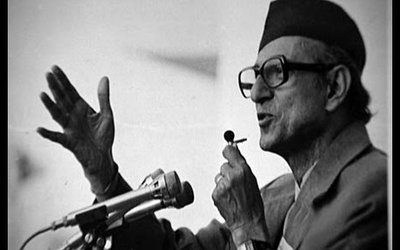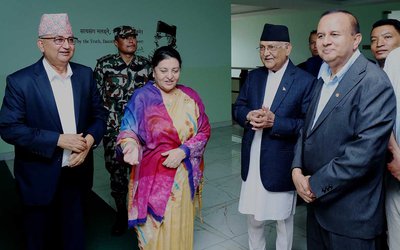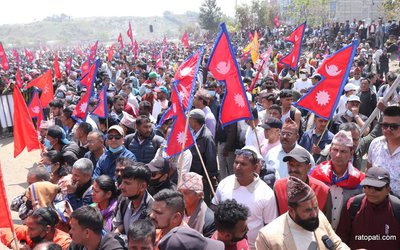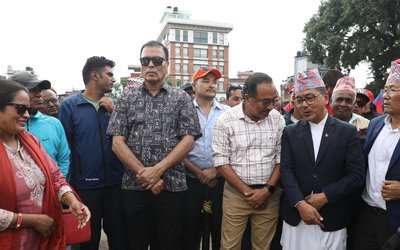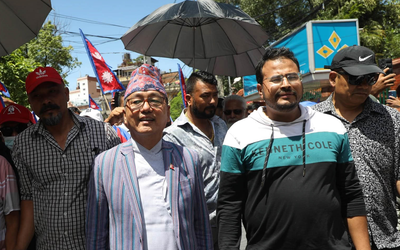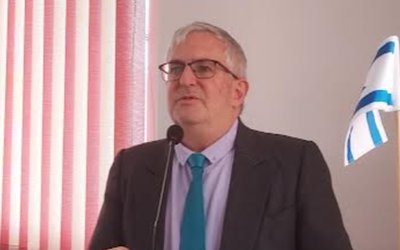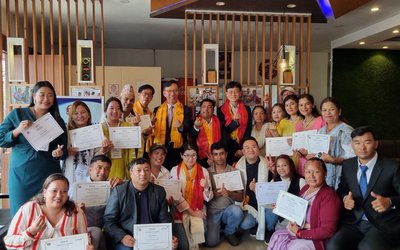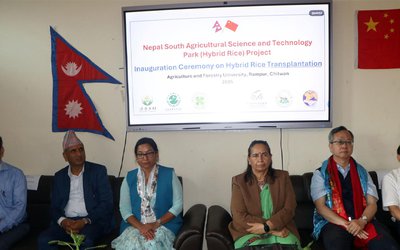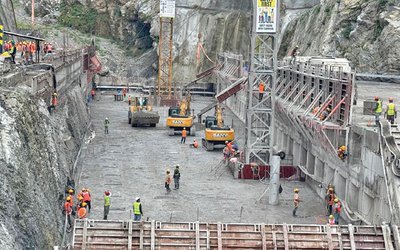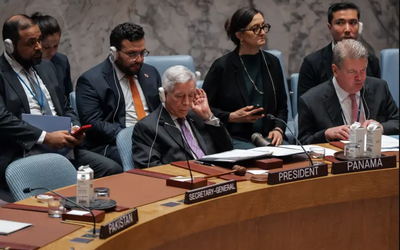
Despite the escalation of the political violence, political parties are finally preparing for the second Constituent Assembly election slated for November 19. At a time when the major political parties are launching nation-wide election campaigns, pledging everything from road to electricity, hospitals and finally new constitution, the 33 parties led by the CPN-Maoist are launching anti-poll activities, announcing a ten-day long general strike from November 11 to 19. Given the current political trend, it is unlikely that the CPN-Maoist coalition can make any significant impact to postpone the election. As election is going to be held on a mixed-electoral process, it is likely to produce a hung Legislature-Parliament, with major three parties UCPN-Maoist, Nepali Congress and CPN-UML securing a combined two thirds. Unlike expectations, it will neither bring much needed political stability, nor the new constitution
“Give us a two thirds majority, we will give you the new constitution. If our party secures a majority in the elections, we will negotiate with the Indian to settle the problems of wild elephants,” thundered UCPN-Maoist leader Pushpa Kamal Dahal Prachanda.
Nepali Congress leader Sushil Koirala made similar remarks. “Nepali Congress needs a two thirds majority to write the new constitution. Nepal will have a new constitution only if Nepali Congress secures two thirds,” demanded Koirala.
“CPN-UML needs a majority to give an effective government and write the new constitution,” said CPN-UML leader and former prime minister Madhav Kumar Nepal. “I will assure you that CPN-UML will bring the new constitution in six months if it is voted to power with majority.”
When leaders of three national parties are demanding two thirds and majority votes, the fractured Madhesh based parties are putting their best efforts to retain their earlier success. At a time when major parties of previous CA are harping on the slogan of new inclusive constitution, economic prosperity, RPP-Nepal, monarchist anti-federalist party, is making its inroads too. In recent times when leaders of major political parties are confined to their own constituencies, RPP-Nepal leader Kamal Thapa travelled from east to west by road on vehicles, competing with UCPN-Maoist leader Pushpa Kamal Dahal, who has been using choppers in the campaign.
Although there are incidents of violent clashes between the workers of major parties and violent assaults by CPN-Maoist led alliance, they do not seem to have the power to deter the election campaigns. From using social media like Facebook and Twitter, the parties are visiting the people in their traditional door-to-door campaigns.
Whatever Prachanda, Koirala and Nepal may publicly demand, they are unlikely to secure a majority, given the present electoral process. Even in the last elections, when Maoists were able to swing the vote, they were short of 70 votes or below the magic number 301. Electoral pundits predict that nothing will substantially change this time. As UCPN-Maoist is split, this is likely to give benefit to Nepali Congress and CPN-UML. Similarly, factions in Madhesh based parties are likely to benefit the three national parties.
Although the Maoist-led 33-party alliance continues issuing threats to disrupt the November 19 polls, by accelerating their violent activities in different parts of Nepal, such incidents are confined to particular regions, including eastern, far-western and mid-western hills.
As political parties and candidates are launching door-to-door campaigns, the elections tempo has overshadowed all other activities. Looking at the election campaigns and participation of people, a good percentage of voters are likely to turn out in the coming elections.
According to Home Ministry, the election campaign is much more peaceful than the previous one. In 2008, the election campaign was more violent. Till writing the story, there were 70 violent incidents that occurred in different parts of Nepal, including the incidents of physical assaults against UCPN-Maoist candidate in Panchthar and CPN-UML candidate in Bhojpur.
“Compared to last elections, the situation is peaceful. Security personnel will not let anybody to violate the law,” Home Minister Madhav Prasad Ghimire told New Spotlight.
As the national and international election observer groups have already mobilized their observers throughout the country, the election is now under a close scrutiny. Given the present situation, the election is unlikely to be postponed without a major political upheaval or crisis. That kind of situation is unlikely at the present political scenario.
Security Situation
Although the security is beefed up, it is still unknown how the security forces will tackle the Maoist cadres who will come out to make their general strike successful. As security forces are scattered across the country for the elections, Maoist cadres are united to crack the security. According to security experts, the government needs to think about contingency plans to meet the Maoist threat after November 11. “We have a contingency program to deal with Maoists,” said a senior police officer. Although the government has promoted Upendra Kanta Aryal as the Additional Inspector General of Police to replace current chief of Police Kuber Singh Rana, who is retiring on November 15, how effectively the new chief can handle the chain of command is an important matter.
Although there are sporadic incidents of election related violence, they are largely local. Since the government has made a good security preparation, security agencies are capable to defuse any kind of disruptive activities. According to Home Minister Ghimire, the government has already directed the concerned district administrative offices to take legal actions against those involved in activities undermining the elections. To give a sense of security to the people, Nepal Army is conducting flag march in all 240 constituencies. Nepal Police has already arrested a number of Maoist cadres involved in violent activities. Home minister Ghimire told this scribe that the government will enforce the law effectively.
Regmi’s Efforts
Following the escalation of election related violence, chairman of the council of ministers Khil Raj Regmi called a meeting of the High Level Political Committee on November 4 and expressed dissatisfaction over the growing political violence among the cadres of major parties. Regmi also requested the party leaders to support the security agencies to minimize the Maoist threat. One of the party leaders, who attended the meeting, told that Regmi expressed his frustration and anger over major party’s apathy towards violence.
In an hour-long meeting, chairman of council of ministers Regmi, and leaders of major political parties agreed to stand for elections. Nepali Congress leader Ram Chandra Poudel told this scribe that members of the high level committee expressed their commitments to uphold the election mementum and work to reduce the tension.
Given the present political trend, the election to the Constituent Assembly is unlikely to be postponed even in the case of continued violence by the Maoist alliance. As leaders of major political parties and workers are already deeply involved in the election process, the election tempo is in full swing and irreversible.
However, some political leaders like CPN-UML leader Madhav Kumar Nepal and NC leader Dr. Ram Sharan Mahat suspect that UCPN-Maoist leader Pushpa Kamal Dahal is conspiring to postpone the elections. According to Nepal and Dr. Mahat, Prachanda may side with Maoists in case he senses his party will lose the present position from the coming election. UCPN-Maoist leader Prachanda outrightly opposed the views expressed by Nepal and Dr. Mahat terming them as conspirators.
National Security Council’s Report
At a time when the government, political parties and security personnel are making the final preparations for the elections, the National Security Council presented a report to chairman of council of ministers Khil Raj Regmi showing the possibility of intensification of violence in the coming days and resumption of conflict in future in case Maoists remain out of the election process. Chairman of council of ministers Regmi rejected the suggestions of the National Security Council’s report to accommodate the Maoists at the last minute through any change in the election process. In a special meeting of high security officials on November 5, chairman of council of minister Regmi assessed the situation and asked security chiefs to take all necessary action to prevent possible Maoist violence.
Maoist Strategy
Although Maoist party workers are intensifying their violent activities, they have not yet made any adverse impact on the election campaign. In the last few weeks, Maoists have been targeting the candidates and their election campaigns. The violent acts of Maoist have injected some kind of fear among the voters and common people. But, it has failed to produce any large scale implications. According to a Maoist source, they have postponed their indefinite strike, initially proposed from November 11 to November 15. According to Maoists, they will put all their strength and energy to paralyze elections from November 15. Although no open claim has been made yet, police and security agencies have discovered a number of hand made weapons and bombs planted in various parts of Nepal. Even capital Kathmandu is not immune. Maoists have also decided to send almost all their leaders underground. Only half a dozen of senior leaders including Mohan Vaidya, Pampha Bhushal and Dev Gurung are in the front line. Officials of the Ministry of Home have looked at Maoist new tactic cautiously. Minister of Home Madhav Prasad Ghimire told this scribe that this is the sign of weakening Maoist strength.
However, the situation is much different in the hills of mid-west, eastern and far western region. Maoist affiliated Limbuwan Rajya Parishad is creating havoc in nine eastern districts, attacking candidates and their vehicles. Similarly, panic is also there in mid-western and far-western hills. In the recent weeks, security personnel have recovered a number of press cooker bombs from different parts of the capital. All this indicates that Maoist are working to terrorize the voters.
International Concern
UN Resident Coordinator to Nepal Jamie McGoldrick, on behalf of the international Community in Nepal, said the international community is encouraged by the resolve, but also the restraint shown so far by the police, security forces and the Home Ministry, in providing election security with professionalism in the face of provocation during this sensitive period.
"Especially we commend the role of thousands of candidates who are conducting their election campaigns abiding by the Election Code of Conduct. Many politicians and their supporters are campaigning peacefully and lawfully despite unacceptable threats and disruptions," said McGoldrick in a statement.
The international community has been showing a great concern, McGoldrick said, adding, international community supports the men and women of Nepal in their right to express their views in peace, either as candidates or voters. "Everyone should respect the democratic right to take part in a peaceful, open and inclusive election," he said in the statement.
While denouncing the threat, violence and Bandhs carried out by some forces against the election, international community in Nepal also urged concerned parties to respect universal principle of free election and the rights of others. "Bandhs or strikes, when enforced by violence or the threat of violence, are a violation of the political rights of citizens and against the laws of Nepal. Preventing peaceful campaigning by others is also unlawful," added the statement.
Elections Activities
The Election Commission has already decided to issue temporary voting cards to all the voters. According to chief election commissioner Neelkantha Uprety, the commission will start their distribution from November 10. Uprety told this scribe that the EC will also distribute the temporary voter ID cards at the house of each voter.
EC Committee Against Election Violators
Following incidents of rampant violation of the election code of conduct, the Election Commission (EC) has formed a high-level committee headed by the chief election commissioner to take action over the major incidents of code violation.
The four election commissioners are the members of the high-level committee, which will come into effect from Sunday. The constitutional body on Saturday also authorized the four election commissioners to take action on the spot against those found guilty of breaching the election code of conduct.
“The high-level committee will be responsible for taking decision on incidents of the election code of conduct about which the four election commissioners cannot take necessary decision on their own,” said Chief Election Commissioner Neel Kantha Uprety.
As per the EC´s decision, Election Commissioner Dolakh Bahadur Gurung has been authorized to oversee violation of the poll code in the Western Development Region, Ila Sharma in the Central Development Region, Ram Bhakta PB Thakur in Mid-western and Far-western Regions and Election Commissioner Ayodhee Prasad Yadav will be responsible for looking into incidents of the election code of conduct violation in the Eastern Development Region.
“The team of commissioners derives authority from clause 7 of the Election Commission Act, 2007 to take action on the spot against any breach of the election code of conduct,” said Uprety. “The chief commissioner as chairman can take action just like the other commissioners and he also chairs the committee if the team is unable to resolve some issues at different levels.”
EC To Enhance Implementation Of Poll Code
The commission decided to enhance the implementation of the election code of conduct. According to the Election Commission, the commission decided to instruct chief district officers (CDOs) and district police chiefs through the Ministry of Home Affairs (MoHA) to coordinate with chief returning officers and returning officers for effective implementation of the election code of conduct.
The EC decided to instruct them (CDOs and district police chiefs) to stop anyone on the verge of breaching the code of conduct and take corrective measures if someone is found acting against the poll code. The commission´s decision comes at a time when there are media reports on rampant violation of election code of conduct even by top leaders of several political parties.
The election code of conduct bars a candidate from using more than two vehicles during the electoral campaign. As per the election code of conduct, any candidate who is found breaching the election code of conduct can be fined a maximum of Rs 100,000 and the EC can annul their candidacy and can disqualify them from contesting polls for six years.
Possible Scenario
Since major political parties have already jumped in the election campaign, disruptions in the process are less likely. One cannot rule out the possibility of sporadic incidents of violence. The recent activities by Maoists have showed that the violence will intensify in the coming days, mainly after November 15. However, it will have little or no implication at the national level. Certain level of violent clashes during the last leg of election campaign may be likely. Along with the clashes with cadres of Maoist, the clashes may also occur among the contestants and their parties.
So far as the election results are concerned, the present trend clearly indicates that three major political parties, the UCPN-Maoist, Nepali Congress and CPN-UML, will secure a combined two thirds of majority and Madheshis will have to pay a price for their fractured politics. Election pundits are predicting that Kamal Thapa led monarchist party RPP-Nepal will make a certain difference in the election. Despite this, no political party is likely to secure even a simple majority given the nature of current electoral process, hence a hung parliament.
In a situation when CPN-Maoist, a major radical political force, is outside the electoral mainstream and RPP-Nepal is making certain progress for a hung parliament, Nepal’s prolonged political instability will have no easy way out any time soon. In the last five years, between 2008 and 2013, Nepal has seen five governments: four under communist parties and the interim caretaker government led by chief justice. As political parties do not have any agreement on major constitutional issues, new constitution will also be unlikely any time soon.
Given Nepal’s past experience and geo-political lessons, a stable government will still be a far cry. Whether election or no election, Nepal’s political crisis will continue beyond November 19.

Keshab Poudel
Poudel is the editor of New Spotlight Magazine.
- LIEUTENANT COLONEL JP CROSS: Centenary Birthday
- Aug 06, 2025
- Israeli Officials Say That 20 People Including Bipin Joshi Are Alive
- Aug 05, 2025
- RASUWAGADHI FLOOD: GLOF Devastation
- Jul 20, 2025
- ERC Nepal Is Focused On Expanding Distribution And Transmission To The Private Sector: ERC Chair Dr. Dhital
- Jul 06, 2025
- FOURTH PROFESSOR Y.N. KHANAL LECTURE: Nepal-China Relations
- Jun 23, 2025
